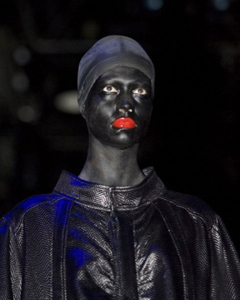|
Intermix.org.uk is a website for the benefit
of mixed-race families, individuals and anyone who feels they have a multiracial
identity and want to join us. Our mission is to offer a view of the mixed-race experience, highlighting icons, film, books, poetry, parenting techniques, celebrities, real lives and much more. Our online forums are a great place to meet others, ask questions, voice your opinions and keep in touch. Sign up for our monthly newsletter and delve into our pages. Want to join in? Become an Intermix member to take part: |
Blackfaces Doing Well In Japan?
 Sony signed controversial blackface band.
Sony signed controversial blackface band.
The Black & White Minstrel Show was first broadcast by the BBC in 1958 and featured white males in blackface make-up presenting songs from the American south and music hall numbers.
Although the show received ratings of over 18 million at its peak it was widely criticised for being racist and a "cultural obscenity". On 18 May 1967, the Campaign Against Racial Discrimination delivered a massive petition to the BBC, requesting that the show be withdrawn for its misrepresentation of Black people. The show remained on the air however and was only was removed from our screens in 1978 due to falling ratings.
The Minstrels may be gone from our screens here in the UK but in Japan a similar picture is being painted.
The Gosperats are a Japanese rhythm and blues band that also appear in black face make-up and are signed to Sony music who also represent artists such as Xhbit, Wu Tang Clan and Rage Against The Machine. They are not the only blackface band in Japan there's also a female group called The Bubble Sisters and several other lesser known bands.
Music is not the only arena where blackened faces are appearing Japanese designer Taisha Nobukuni has brought blackface to the catwalk in his presentation for Tokyo Fashion Week.
So how does Japan feel about black culture? In 1986, the Prime Minister, Yasuhiro Nakasone, said Japan had a higher ‘intellectual level’ than the US because America had ‘Blacks, Mexicans and Puerto Ricans’ – a comment that proved controversial abroad but caused barely a stir in Japan.
Some Japanese teenagers however are obsessed with Black culture. There are many established reggae sound systems and no end of hip-hop followers in Japan.
Unfortunately The Gosperats are playing to packed venues and Taisha Nobukuni's show at Tokyo Fashion week doesn't seem to have caused much of a stir in the western press. Still if Japanese youth believe blackening up their faces is the way to show their appreciation of Black culture they are surely misguided and lets hope that a few of Sony's other artists put them straight.
Source:
